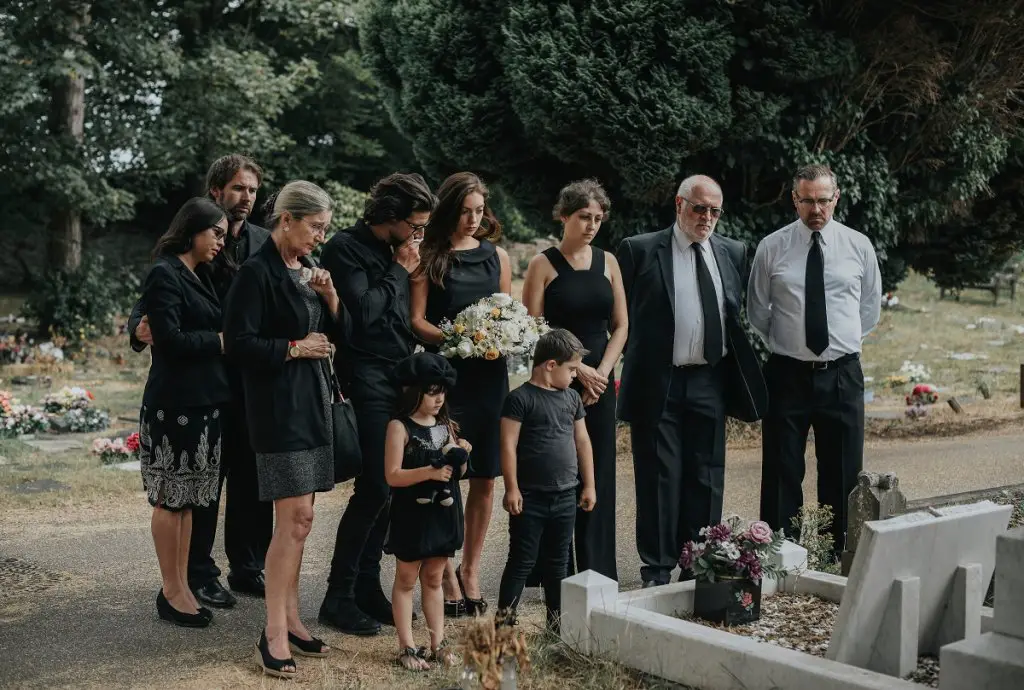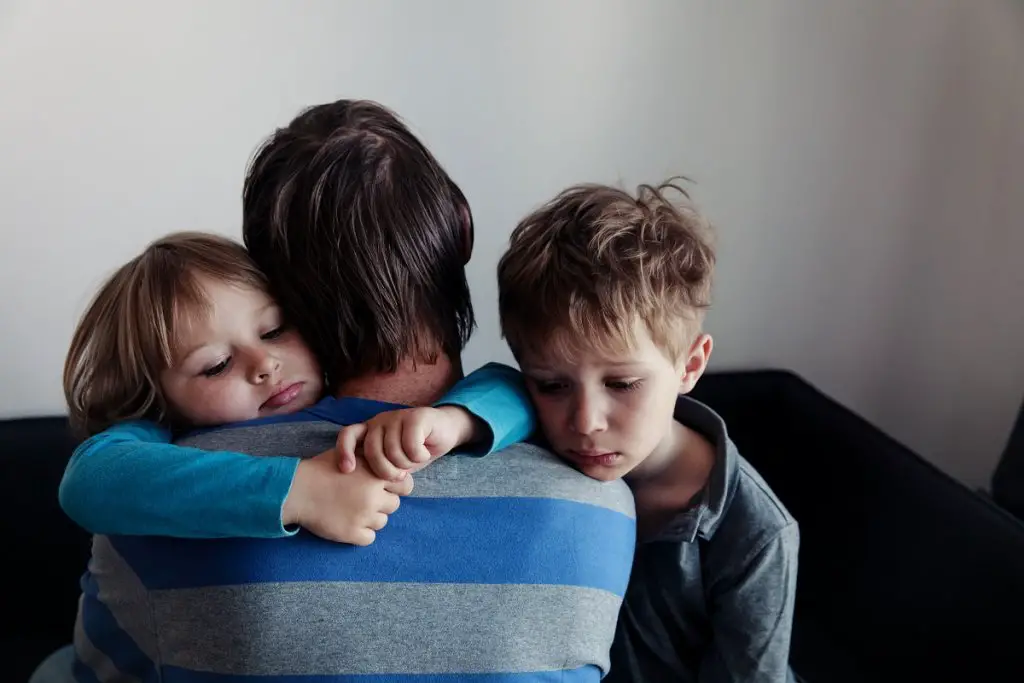When you are processing your own grief after losing a loved one, the words “I’m sorry for your loss” can sound hollow, yet those very words - sorry for your loss - are at the heart of most meaningful sympathy messages. They can help both you and your family as you try to process your grief. How else can you convey the same sentiment without sounding trite?
When someone close to you dies, you may have to deal with your own grief and that of others in your family or friend group. When you lost your husband, his parents and your children had a loss they are all dealing with too. As you process your own grief, you may need to reach out to the other family members in mourning.
However, it is important that your both process your own sadness and be a sounding board for family.

Table of Contents
How Do You Say Goodbye To Someone Who Has Passed Away?
As you process grief, you must say goodbye to the loved one.
There’s no right or wrong way to say goodbye to someone who has passed away. Sometimes it feels right to do it at the wake, funeral, or memorial service as you stand before the casket, but you may need a longer, more personal goodbye.
Doing something meaningful is a fitting way to say goodbye to a friend or family member who was a special person in your lives and can greatly help the grieving process. Here are some ideas:
Write A Goodbye Letter
You can pour your heart out onto the pages, or you can keep it simple and heartfelt. Write as though they were still alive; write about a favorite memory, a funny thing that happened years ago, and tell them how you feel about them – even if that feeling is “anger” that they are gone. Express yourself as fully as you want and say farewell the way that feels right for you.
When you’re done, you can keep the letter, share it, or destroy it.
Read A Goodbye Poem
There are many beautifully written ones that can encourage you in a sorrowful time. Often, we find our words fail us when trying to express the depth of our love and grief, but poetry has the gift of capturing just the right sentiment; it allows us to borrow from it and express our goodbyes through it.
Finding the right poetry for how you would like to say goodbye isn’t difficult; hundreds of remembrance poems range from religious to non-religious, somber and reflective to light-hearted or even slightly irreverent.
Some of the more popular remembrance poems are:
“Do Not Stand At My Grave And Weep” by Mary Frye
“Death Is Nothing At All” by Henry Scott Holland
“Funeral Blues” by W.H. Auden, popularized in the movie Four Weddings and A Funeral
“Do Not Go Gentle Into That Good Night” by Dylan Thomas
“Warm Summer Sun” by Walt Whitman
You can share the poem with the grieving friend or family member, or read it privately to help assuage your own grief.
Go To A Special Place
Go somewhere that held some meaning for you and the deceased. Maybe it’s the coffee place you stopped at regularly or a route you would often walk together. It doesn’t need to be a showy or overly ceremonious moment if that’s not your style, just somewhere important to you both where you can have a quiet moment to say your farewells.
If others who are grieving shared your special spot, you can go together and offer support to one another.
Do Something That You Used To Do Together
Would you meet up and go fishing? Were you on a sports team together? Perhaps you used to bake together or go walking? It can be indescribably difficult to do these things alone for the first time, but you can also make it a way of remembering your loved one by doing it in their honor.

Listen To Music
Music, like poetry, is a wonderful outlet for expressing grief and love and all the tangled emotions that come with the death of a special person. At times the most appropriate and heartfelt goodbye sentiment comes from lyrics that manage to say what we truly feel when our own words have failed us.
Make A Scrapbook Or Slideshow
One popular way of saying goodbye to someone is to create a slideshow of photos and videos of you together, set to music by the deceased’s favorite band, for example.
If you are a creative type, create a scrapbook or memorial album. Printed photos, ticket stubs, pictures of things they loved and places they visited, fond memories you have written down, and other souvenirs from your time together are good additions. Crafting can be a very therapeutic way of saying goodbye – especially if you didn’t get the chance to do it face-to-face.
You might want to share some of your memories at a memorial service or celebration of life.
Post On Social Media
Social media is a common way to communicate information, even about how you are feeling about the death of a loved one. You can not only post arrangements in a place will see them, but you can write a tribute to the beautiful soul you lost. You can invite others to share wonderful memories of your loved one.
If the rest of the family is on board, you can tell your audience any information you want them to know about the death, your preferences for flowers or charities to remember in the name of the deceased, and any requests in your time of need.

Why is “Sorry For Your Loss” At The Heart Of Any Simple Condolence?
While it may come across as a trite and overused platitude, “sorry for your loss” is a simple and heartfelt way of acknowledging the scope of pain and the profound sense of “gone” that comes with the passing of a loved one.
When you are grieving, you will hear this plenty from friends and other family members – to the point you want to gag when yet another person says it.
Some people make a distinction between saying “I’m sorry for your loss” vs. “Sorry for your loss.” Essentially there is no real difference in meaning between these two expressions. Saying “I’m sorry” is more personal way of conveying condolences to someone who has lost a loved one.
Grief is such a powerful emotion that often words seem inadequate; the right words to convey your deepest sympathies just won’t come. How can anyone express the depth of sadness and pity and feeling of “goneness” in words? Whether the passing was sudden or expected, it seems impossible for anyone to truly express how sorrowful they are that you now have a hole in your life.
“Sorry for your loss” may not feel powerful enough to communicate the entirety of a loss. Still, it does encompass a vast depth of sympathy, empathy, compassion, and condolence in just four words.
What people say to you can’t lighten your burden of grief, but they are trying to make you feel not so alone. Even as you are grieving, you may find yourself saying the same words to other family members who are also reeling from the loss.

What You Don’t Want To Hear And Should Avoid Saying
It’s hard to find the right words, and death – especially sudden death – often leaves us struggling to express how we feel. Sometimes, we can unwillingly say the wrong thing and unintentionally hurt the feelings of people who are already dealing with so much pain. A little bit of sensitivity can go a long way during this time of grief.
Even in conversations between family members, there are some common phrases that it might be best to avoid if possible:
“I understand how you feel…”
When the person who was your husband, your children’s father, and your inlaws’ son passes away, the deceased is the same person. The profound loss will be different for each person involved. So, you really don’t understand how a mother feels in losing her son vs. how a wife is devastated at the death of her confidant and lover vs. how a child reacts to losing a parent they had a special bond with.
One grieving person should not invalidate the pain of others wrestling with the same death.
A kinder option would be “I’m here for you” as an opening to talk about how loss impacted each of you.
“There’s a reason for everything…”
This is unhelpful at best, insensitive and hurtful at worst, especially when the family is grieving a younger person or child. Even if they or you believe there is a sort of divine plan, this can come across as dismissive of the pain of losing a close friend or family member.
When you have a loss of great magnitude, you do not want to get philosophical as you are processing it.
“I’m sure you feel XYZ…”
You can’t presume to know how anyone is feeling at such a delicate time. People react to grief in so many different ways and with varying degrees of emotion – anger, sadness, numbness, and fear to name a few. There is no way of knowing how someone is dealing with their emotions at such a challenging time.
All you can say to a fellow griever is, “I feel this way – angry, devastated, afraid, etc. How do you feel?” A discussion might help each of you.
“It will get better…”
Time is the great healer, as the saying goes, but in the midst of fresh loss, this may only trivialize their pain.
If you have experienced prior losses, you know you won’t always feel the way you do at first. Rather than trying to share this wisdom with your grieving family member, it’s better to assure them that it’s okay to feel what they do right now.
“At least she/he isn’t suffering anymore…”
When you have watched your loved one suffer from an extended illness, you may want their suffering to end. While your dad was a wonderful man you didn’t want to lose, you saw him slipping away and his pain worsening. You may feel a certain peace when he dies. Such feelings are private in a family and not something most want to discuss publically.
When dealing with other family members, you might want to focus on the loving memories you had together and express condolences for the loss you share. If you are religious, you might take consolation in that your dad is now with God enjoying soul rest.

Dealing With Family Loss
When a beloved family member dies, the whole family unit may be plunged into grief. In this sorrowful time, each family member may grieve differently, even though it is a tough time for all.
Here are a few ideas to help you and your family deal with grief:
- Talk about the person who died and the special connection you had with them. Personalize your discussion with the person’s name. Extend words of sympathy to others within the family to whom the loss was personal as well as collective.
- Tell stories and express what the person meant to you. Not every memory will be a great one, as relationships are complex. If one family member has anger or other unresolved feelings about the deceased, give them a forum to release their feelings.
- Respect the personal grieving process of every family member. Grief affects people differently and may take some more time to process it. Pay special attention to the needs of grieving children who are new to the concept of losing a loved one.
- Stay in communication with family members by text message, phone, or email if you don’t see them in person. Tools such as Zoom and Facebook Live make it possible to share laughs and tears, bible verses or words of comfort, and expressions of love, even if in-person hugs aren’t possible.
- Get together to write sympathy notes. review the messages on condolence cards, and talk about your loved one. Deaths can sometimes bring out the worst in families as old rivalities and disagreements come to the surface, but do what you can to bond in your time of loss.
- Accept changes in role and family traditions. The changes may mean seeing family members in new and unfamiliar ways, leading to resentment.
- Plan ahead for family times such as holidays, birthdays, and the anniversary of the death. These times might be more difficult for you and your family.
- Accept offers of support from outside the family. Other family members may be unable to provide you with the tangible help and support you need. If a neighbor you trust offers to babysit so you can get away for a few hours, take them up on it, as your mom or sister may not be up to the task.

What Are Some Examples Of Sorry For Your Loss Messages?
As you process your grief, remember that many people came forward to offer you sincere condolences as they tried to say, ‘I’m sorry for your loss.” In reading the messages, you may realize how loved the deceased was and how much support there is for your grieving family.
As you read the sympathy card messages, text messages, and social media posts, be aware that many people want to offer support to you,
Here are some of the variations on “I’m sorry for your loss that you may see:
- Please accept my heartfelt condolences at this sad time.
- I can’t imagine how you must feel right now. I’m here for you.
- You are in my thoughts and prayers.
- We were saddened to hear of the loss of such a wonderful person.
- I’m deeply sorry to hear of your mother’s/father’s passing. I will always treasure the happy memories I have of him.
- Sincerest condolences to the entire family on the passing of your dear grandmother. She was a very special person who will be missed by us all.
- Thinking of you all at this difficult time.
- I’m going to miss your sister/brother so much. She/he was a wonderful person.
- Sharing in your sadness as we remember your mother. May she rest in peace.
- Wishing you peace, comfort, and love at this sad time.

